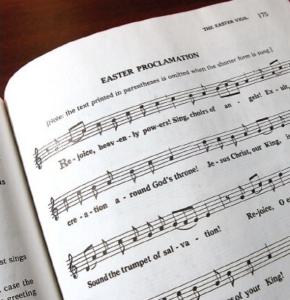Every Easter Vigil, deacons throughout the archdiocese face one of the most challenging yet spiritually rewarding duties of their ministry: chanting the Exsultet.
Standing in front of as many as 1,000 people or more inside churches illuminated by candlelight, deacons sing the traditional Easter proclamation without accompaniment as all eyes are fixed on them.
“It’s very intimidating,” said Deacon Ray Moreau of the Cathedral of Mary Our Queen in Homeland. “But once I start singing those first few notes, the intimidation leaves and it’s amazing how you become calm and the Spirit is with you and it works.”
Intoning the triumphant chant is one of the most prayerful and reflective moments of the liturgy for Deacon Moreau. The chant takes its name from the Latin word in the opening line, “Rejoice, heavenly powers!”
“It’s an amazing compilation of the story of salvation that leads up to the Resurrection,” Deacon Moreau explained. “It covers the complete beginning and end from Adam and creation and sin and redemption. It takes you to the Resurrection.”
Deacon Charles Hiebler called it “an honor and a privilege” to sing the hymn.
“It’s the first proclamation of the risen Christ,” said Deacon Hiebler, who has chanted the Exsultet at the Cathedral of Mary Our Queen where he is now assigned and at Immaculate Heart of Mary in Baynesville.
To prepare, Deacon Hiebler listens and practices to a recording of the lengthy chant and studies the pattern of the music’s many rising and falling notes weeks before the Easter Vigil.
“I meet with the music director to make sure I have the notes down right until it becomes almost natural to sing it,” he said. “It’s got to be perfect or close to it so it’s not a distraction, and it proclaims the message that you’re attempting to sing.”
The biggest challenge is competing with the billowing clouds of incense that usually linger in the sanctuary at the exact time the chant must be sung, he said. The Exsultet is sung following the blessing of the Paschal Candle.
“I make sure I drink some water before Mass,” he said.
Deacon Herman Wilkins knows all about the pressures of singing the Exsultet. He recalled struggling with the challenging music during the 2003 Easter Vigil at Our Lady of Hope in Dundalk. Admitting that his singing voice is less than stellar, he remembered that there was a loud crashing sound like breaking glass a few minutes into the chant. A choir member had dropped a set of bells.
“All I could think was that my voice shattered the stained glass,” Deacon Wilkins remembered with a laugh. “I had to get myself composed. I’ll tell you, it took about five minutes to sing but it seemed like forever.”
Deacon Wilkins later used his experience with the Exsultet in a homily about hitting challenges head on. He no longer sings the chant, demurring to a music minister, he said.
“It’s a beautiful prayer for Easter, and it should be given the reverence of someone who knows how to sing,” he said.
While it is normally the deacon’s responsibility to proclaim the Exsultet, it may also be sung by a priest or, with some modifications, by a layperson.
A secret to a successful Exsultet is starting in the right key, according to Deacon Moreau. Start too high or too low and you’re sunk, he said.
“I ask the Lord to be with me and make me an instrument of praise to come out well enough that the people experience the joy and the prayerfulness of it,” he said.
Email George Matysek at gmatysek@CatholicReview.org
Copyright © 2009 Catholic Review Media

